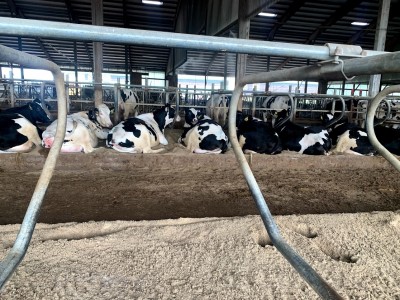8 Ways to Reduce Somatic Cell Counts in Your Dairy Cows

8 Ways to Reduce Somatic Cell Counts in Your Dairy Cows
Daniela Roland, Dairy Educator, Penn State Extension Jun 28, 2023 (To access the original article, click here)
Dairy farmers usually see spikes in somatic cell counts during summer months, often leading to a rise in mastitis.
Research has shown that high levels of stress hormones in dairy cows interferes with the immune system's ability to fight bacterial invaders. When cows become heat stressed, they are at a higher risk of picking up a mastitis-causing pathogen.
Many factors can influence SCC, from housing to lactation phase and milking protocols. With tighter margins and lower projected milk prices through the summer, focusing on management practices that can be controlled can help maintain or improve milk quality.
Maintaining milk quality is not only important from an animal well-being perspective, but it's also critical to maintaining a milk market. Milk processors want to be assured the milk leaving your farm is high-quality. The presence of elevated somatic cell counts in milk above regulatory standards can negatively affect the milk's taste, odor and shelf-life, and negatively affect the production of dairy products like cheese and yogurt.
What are somatic cells?
Somatic cells are primarily made up of leukocytes, or white blood cells, which are the defense cells needed to fight invading pathogens.
All dairy cows have some somatic cells. In general, an SCC of under 200,000 cells/mL indicates a healthy dairy cow. When SCCs are above 200,000 cells/mL, a subclinical or clinical infection in the udder may be present.
Management Methods for SCC
Here are some management tips to help reduce somatic cell counts within your herd:
- Provide fresh, clean, dry bedding. Keeping stalls clean and dry can minimize bacterial growth. Organic bedding material such as sawdust, straw or recycled manure when wet can provide ideal growing conditions for bacteria. Inorganic bedding like sand and lime are best for helping to prevent the growth of mastitis-causing pathogens. Regardless of what bedding is used, it's important to remember that proper bedding management is key to keeping SCC values down and preventing bacteria from entering teat ends.
- Follow a proper milking procedure. Your milking protocol should include a pre-dip, post-dip and fore-stripping to detect any milk abnormalities. Individual clean and dry towels should be used to wipe off the teat ends. It is recommended that milking units be attached within 60-90 seconds after proper udder stimulation. Milkers should wear clean, disposable gloves to prevent the spread of bacteria.
- CMT paddle or on-farm milk culturing. A California Mastitis Test can be a useful tool to check individual quarters on fresh cows or detect high SCC cows. Milk culturing can also be a cost-effective practice to detect what pathogens are affecting your herd.
- Minimize flies. Flies can not only be a nuisance to animals and people, but can also be carriers for diseases, including mastitis-causing pathogens. Keeping all areas around the farm — including calf housing, feed alleys and barnyards — free of extra manure, debris and old feed can help control flies.
- Provide cooling to avoid heat stress. Cows can experience heat stress at temperatures as low as 72 degrees with 50% humidity. Provide plenty of fresh water, shade and cooling methods like fans and sprinklers. If sprinklers or misters are used, ensure they are working properly to prevent the cows and bedding areas from becoming too wet which can increase the likelihood of bacterial growth.
- Cull high SCC cows. While it may be a difficult decision to decide to cull a cow, getting rid of a high SCC cow that hasn't responded to treatment can help lower your bulk tank SCC.
- Dry cow teat sealant. Using dry cow therapy and teat sealants is a common practice. If you are seeing a high rate of fresh cows with mastitis, consider using a teat sealant when drying off cows. Consult with your veterinarian to determine which dry cow therapy would be best for your herd.
- Maintain milking equipment. It is important to routinely do performance checks on your milking equipment. The total milking unit on time can affect teat end health. If cows are being overmilked, this can result in teat end damage, leading to hyperkeratosis and mastitis.
Finding the cause or causes of high SCCs within your herd can be challenging. Taking on a whole farm approach to pinpoint the problem can help you improve your herd's milk production and achieve lower SCCs.
If you want more information about scheduling a milking evaluation or have questions about milk quality, Camila Lage at cd546@cornell.edu
Upcoming Events
WEBINAR - Automated Milking Systems Efficiency: Balancing Focus on Individual Cows and System Optimization
May 8, 2024
Please join Cornell the SWNY team and MSU Extension for our talk with Dr. Pablo Silva Boloña on improving efficiency of Automated milking systems by focusing on milking settings for individual and group success.
Broiler Field Day at Sunny Cove Farm
June 6, 2024
Alfred Station, NY
Join us for a field day to explore broiler production, processing, and finances. Meghan Snyder of Sunny Cove Farm will be our host. She raises small batches of organic broilers, processing them on-farm under the 1,000 bird exemption.
Cornell Seed Growers Field Day
July 2, 2024
Ithaca, NY
Please Save the Date for the Cornell Seed Growers Field Day to be held the morning of July 2nd. The event will be held at the NYSIP Foundation Seed Barn, 791 Dryden Rd., Rt. 366, Ithaca, NY.
Announcements
No announcements at this time.





